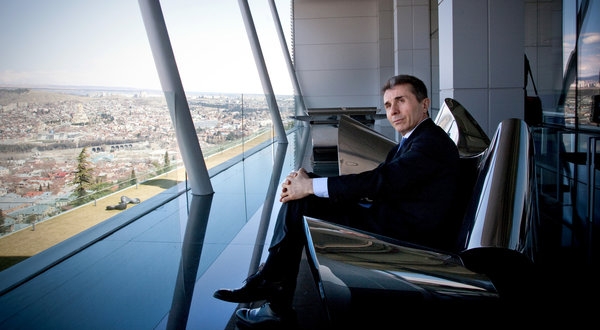Ivanishvili’s Vast Offshore Holdings Exposed in Panama Papers Leak
TBILISI – The massive Panama Papers leak by the Organized Crime and Corruption Reporting Project that saw the release of 11 million documents from the secretive Panamanian law firm Mossack Fonseca has finally cast a light on how many of the world’s richest and most powerful politicians launder money, dodge sanctions and avoid taxes.
In one of the world’s largest data leaks, Georgia’s oligarch and former Prime Minister Bidzina Ivanishvili is listed alongside Russian President Vladimir Putin, Ukrainian President Petro Poroshenko, Azerbaijan’s Ilham Aliyev and some of the world’s most notorious dictators that include former Libyan strongman Muammar Gaddafi and Syrian President Bashar al-Assad as having used Mossack Fonseca to launder money through a web of shell companies scattered across the globe.
In a country where the 2015 GDP was registered at USD 16.5 billion, Ivanishvili makes little pretense about his estimated USD 5 billion fortune. His eccentric behavior over the years has included building a USD 50 million glass and steel compound on a historic hill overlooking Georgia’s capital Tbilisi; reminiscent of a modern-day sultan’s palace crossed with Citizen Kane’s Xanadu, accumulating one of the world’s largest private modern art collections and, most recently, controversially uprooting a rare tree from the country’s southern Black Sea region Adjaria and having it shipped to his private garden further up the coast.
Though born into relative poverty in Georgia’s western Imereti Region, the slight-built and intensely private 60 year-old Ivanishivili spent most of his life in Moscow, where in the early 1990s he accumulated the majority of his vast wealth in banking and mining during Russia’s free-wheeling privatization period following the collapse of the Soviet Union.
After returning to Georgia in the mid-2000s as by far the county’s richest person, Ivanishvili later transformed his vast wealth into political clout when he founded the ruling Georgian Dream Party that unseated the country’s staunchly pro-Western former President Mikheil Saakashvili in 2012.
During his brief 13-month tenure as Georgia’s prime minister in 2012-2013, Ivanishivili was required to publicly disclose information about his personal wealth. The 72 pages of released documents listed dozens of international properties, stock holdings, bank accounts and businesses amongst Ivanishvili’s assets.
The one company, however, that has for several years been linked to Ivanishvili, but did not appear on the list of declared assets, was the British Virgin Islands registered Lynden Management.
Ivanishvili never publicly denied his involvement with Lynden Management during his time as prime minister, going so far as to issue a statement through his spokesmen in which he claimed to have had no interest in the company in 2011-2013 and was therefor not obligated by law to report or declare any activities with the company.
According Georgia’s 2012 statutes on conflict of interest and corruption in public service, all officials must declare companies from which they receive any kind of income during the declaration period, including as a beneficial owner, founder or shareholder. If the officials fail to fully disclose complete information related to their assets, they would be charged with having broken the criminal code that regulates such cases.
Though Lynden Management was first registered in the Virgin Islands in 2006, Ivanishvili was not identified as the beneficial owner of the company for nearly half a decade, and spent the next four years barring his representatives from providing Mossack Fonseca with a copy of his passport and proof-of-address.
Both were required by the British Virgin Islands’ Financial Investigation Agency after they launched an inquiry into violations of the global anti-Money Laundering and Terrorist Financing Code.
Mossack Fonseca’s Singapore office, which was handling the Lynden account, was able to confirm in 2011 that Ivanishvili was the beneficiary owner of Lynden Management through a trust set up by Switzerland’s Credit Suisse.
The firm later received a letter from the Virgin Islands’ investigative agency in November 2011 demanding that the owners, directors, shareholders and beneficiaries of Lynden Management provide their passports and full account details on all of their other assets and connected companies, as well as the firm’s due diligence records concerning Lynden.
According to the leaked documents, the firm’s Singapore office notified the Panama home office that Ivanishvili was, in fact, the company’s beneficial owner. The information regarding Ivanishvili’s identity - without supporting documents - was then passed on to the Virgin Islands’ authorities and the inquiry was later closed.
The question of Ivanishvili’s passport, however, remained in question as he refused to provide a copy to Mossack Fonseca, though the firm needed an identification document and proof-of-address to comply with international anti-money laundering regulations.
The leaked documents reveal that Mossack Fonseca’s Singapore office had grown so concerned over Ivanishivili’s refusal to hand over his passport that they requested advice from the main Panama office about what the legal consequences would be if Ivanishvili refused to comply with their request.
The firm’s Panama office later informed Singapore that Ivanishvili’s failure to hand over his passport would result in “high administrative and statutory fines, as well as a possible criminal investigation.”
Mossack Fonseca finally received a copy of Ivanishivili’s passport, but no proof-of-address, in August 2015.
Ivanishvili’s association with Lynden Management has been difficult to connect, not least of which because no public or private statement has ever been made as to why the company was formed, according to the leaked documents.
Through Lynden Management, Ivanishvili and several other associates controlled up to 20 per cent of the stock of Raptor Pharmaceuticals, a major US-based company that suffered through a tumultuous 2015 after its clinical trial for a drug to treat children with a disorder that causes fat buildup in the liver, failed miserably.
According to the documents, Ivanishvili lost up to USD 100 million in an account with Raptor listed as its main asset. He has since filed lawsuits against Credit Suisse, claiming one of the bank’s private investment bankers illegally shuttled money into risky investments and hid the massive losses from Ivanishvili.
The banker, Patrice Lescaudron, has also been accused of transferring money from Ivanishvili’s account into the accounts of two-unnamed Russians with ties to the Kremlin and Alexey Miller, head Moscow’s state-run energy giant Gazprom and a close confident of Russian President Vladimir Putin, to cover the losses.
Ivanishvili’s lawsuit against Credit Suisse claims Lescaudron intentionally mismanaged his portfolio by illegally hiding losses in high risk investments, but makes no mention of Lynden’s role in the matter or why his investment banker transferred funds into the accounts of well-connected Russians.
The affect the Panama Papers have on Ivanishvili’s standing remains to be seen. The murky and often convoluted case regarding the handing of his identification documents do little to shed light on any criminal wrong doings, but they do raise serious questions as to why he went to such lengths to conceal his ownership of Lynden Management at time when he knew full disclosure was required by Georgian and international law.
Furthermore, he has yet to explain why Lynden was formed more than a decade ago and what sort of business it was meant to conduct.
At a time when his much-maligned Georgian Dream coalition is collapsing, the Panama Papers reveal the lengths to which Ivanishvili will go to avoid exposing himself politically.
Georgians will not know the extent of the overall fallout from the leaks until they go to the polls next autumn.
By Nicholas Waller












